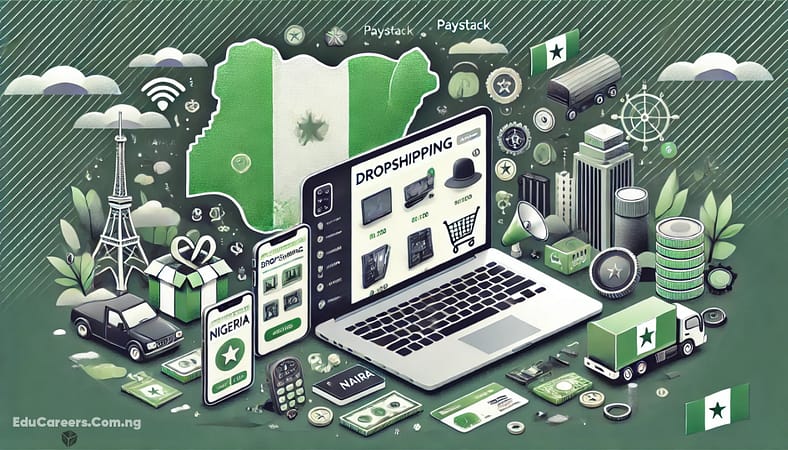Starting a dropshipping business in Nigeria is one of the most lucrative opportunities for aspiring entrepreneurs, especially with the rise of e-commerce and online shopping. If you are looking to break into the world of digital business without the heavy financial burden of managing inventory, dropshipping could be your perfect solution. In this article, we will break down how to create a successful dropshipping business in Nigeria with proven strategies, a clear step-by-step guide, and key insights to give you a competitive edge in 2025.
What is Dropshipping? Understanding the Basics
Dropshipping is an e-commerce business model where you, the seller, don’t hold inventory. Instead, when a customer places an order on your online store, you purchase the item from a third-party supplier who then ships the product directly to the customer. This eliminates the need for warehouses, reducing both overhead costs and risks associated with unsold products.
This model is especially beneficial in Nigeria, where operational costs can be high, and traditional business models often require substantial investment. With dropshipping, the barriers to entry are low, making it an ideal business opportunity for anyone wanting to venture into online retail.
Why Dropshipping is Perfect for Nigerian Entrepreneurs
Before we dive into the steps to starting your business, it’s important to understand why dropshipping is especially well-suited for Nigeria:
1. Low Capital Investment
In Nigeria, the initial capital required to start a business can be a barrier. Dropshipping addresses this by allowing you to sell products without purchasing them in bulk. This means no need for loans or significant upfront capital—just a small budget for setting up your online store and advertising.
To Receive Latest Updates on: Scholarships, Internships, Recruitments and Job Opportunities Join our Telegram and WhatsApp Group Now!!
2. Access to Global Suppliers
You can source products from international suppliers on platforms like AliExpress or local Nigerian suppliers. This flexibility allows you to cater to diverse customer preferences without worrying about product sourcing or delivery logistics.
3. Mobile-First Market
With over 70% of Nigerians accessing the internet via mobile devices, dropshipping offers a mobile-friendly business model that easily adapts to the way Nigerians shop. This provides a huge advantage in terms of visibility and ease of customer access.
4. Scalability with Minimal Risk
The dropshipping model is incredibly scalable. As your business grows, you can easily add more products, expand your customer base, and experiment with different marketing strategies—all without substantial risks or overhead costs.
How to Start a Dropshipping Business in Nigeria: 7 Key Steps for 2025
Step 1: Research and Choose a Niche with High Demand
Selecting the right niche is crucial to your dropshipping business success. A good niche allows you to focus on a specific market and target customers more effectively. Here’s how to choose a profitable niche for your business in Nigeria:
- Focus on Trends: Research trending products in the Nigerian market. Use tools like Google Trends and social media to find what people are interested in.
- Identify Local Pain Points: Products that solve specific problems within Nigeria, such as affordable tech gadgets, health products, or local fashion, often perform well.
- Competition Analysis: Ensure your niche is not oversaturated, but still has demand. Use platforms like Jumia, Konga, and even Instagram to see what competitors are offering.
A good niche ensures your business stands out and attracts the right customers without directly competing with every other e-commerce store.
Step 2: Find Reliable, Cost-Effective Suppliers
Finding trustworthy suppliers is essential to maintaining customer satisfaction and growing your dropshipping business in Nigeria. Some best practices for finding reliable suppliers include:
- Check Supplier Reviews: Platforms like AliExpress provide supplier ratings. Choose suppliers with high ratings and positive reviews from other Nigerian retailers.
- Local Suppliers: Partnering with Nigerian suppliers can reduce shipping time and costs. Explore local e-commerce hubs like Lagos or trade shows to find local wholesalers who are dropshipping-friendly.
- Supplier Reliability: Test your suppliers with small orders before committing to larger sales. Timely shipping and product quality are key to retaining customers.
Step 3: Set Up Your E-Commerce Store
A professional and user-friendly online store is the foundation of your dropshipping business. Use platforms that offer easy setup and customization to match Nigerian business needs:
- Bumpa: This platform is particularly suitable for Nigerian entrepreneurs due to its ease of use, mobile optimization, and integrated local payment solutions like Paystack and Flutterwave.
- Shopify: Offers a global reach with customizable templates and apps tailored for dropshipping.
- WooCommerce: A cost-effective solution if you’re familiar with WordPress and want more control over your store.
Ensure your store is mobile-friendly, as a large percentage of Nigerian users shop via mobile devices.

Step 4: Optimize Your Store for SEO and Mobile
To drive organic traffic, optimizing your store for search engines (SEO) is crucial. Here’s how you can do it:
- Mobile Optimization: As mobile shopping is predominant in Nigeria, ensure that your store loads quickly on mobile devices.
- SEO for Nigerian Market: Include keywords that Nigerian shoppers are likely to use, like “buy tech gadgets in Nigeria” or “affordable fashion accessories Lagos.”
- Product Descriptions: Write detailed, informative product descriptions with local language and cultural relevance.
These optimizations will help improve your store’s visibility on search engines and increase organic traffic.
Step 5: Leverage Social Media and Influencers
Social media plays a pivotal role in Nigerian e-commerce. Use platforms like Instagram, Facebook, and Twitter to:
- Build Brand Awareness: Consistently post engaging content about your products and the value they offer.
- Influencer Marketing: Collaborate with Nigerian influencers who can showcase your products to a large, targeted audience. Look for micro-influencers who have engaged followers in your niche.
- User-Generated Content: Encourage customers to share their experiences on social media. Reward them with discounts or shout-outs to build community trust.
Step 6: Drive Traffic with Paid Advertising
Once your organic SEO is in place, paid advertising can significantly boost your store’s visibility:
- Facebook & Instagram Ads: These platforms have robust ad systems tailored to the Nigerian audience. Focus on targeting Nigerians based on location, demographics, and interests.
- Google Ads: Invest in Google search and display ads to appear at the top when users search for products similar to what you offer.
Step 7: Analyze, Improve, and Scale
Constantly monitor your sales, customer behavior, and marketing results to identify areas for improvement. Tools like Google Analytics and your platform’s built-in analytics will help you track key metrics. Focus on:
- Customer Retention: Offering excellent customer service, discounts for repeat purchases, and personalized emails will keep customers coming back.
- Scaling: As your business grows, you can increase your product offerings, expand your marketing efforts, and consider local warehousing for faster delivery.
Conclusion: Ready to Launch Your Dropshipping Business?
Starting a dropshipping business in Nigeria is an exciting opportunity with low risks and high potential for profit. By following these steps—choosing the right niche, partnering with reliable suppliers, optimizing your store, and leveraging effective marketing strategies—you can launch a successful business.
Stay consistent with learning and adapting to the market, and you will see your dropshipping business thrive in 2025. The Nigerian e-commerce market is booming, and now is the best time to get started!
Frequently Asked Questions (FAQs)
You can find local dropshipping suppliers by attending trade shows, using platforms like Jumia, or networking with wholesalers in markets like Balogun, Lagos.
Yes! Bumpa is a great tool for Nigerian entrepreneurs, as it provides an easy-to-use platform for creating a mobile-optimized dropshipping store.
With the right tools and suppliers, you can launch your dropshipping business in as little as one week.
Stay Tuned for More Tips on Building Your E-Commerce Empire!
For more actionable advice on starting your business, optimizing your store, and maximizing profits, stay tuned to EduCareers.com.ng. Like, share, and comment to join the community of entrepreneurs!






